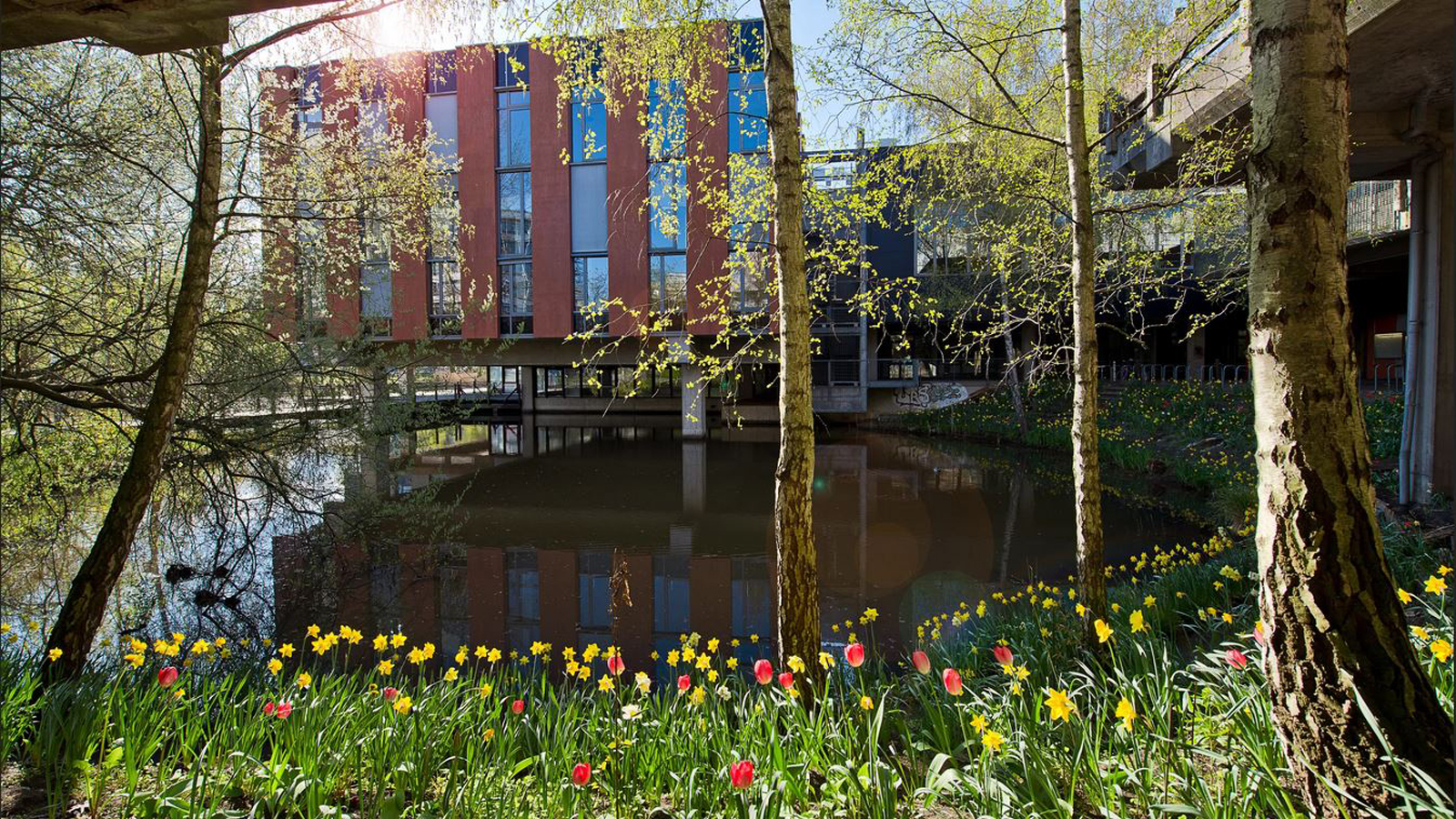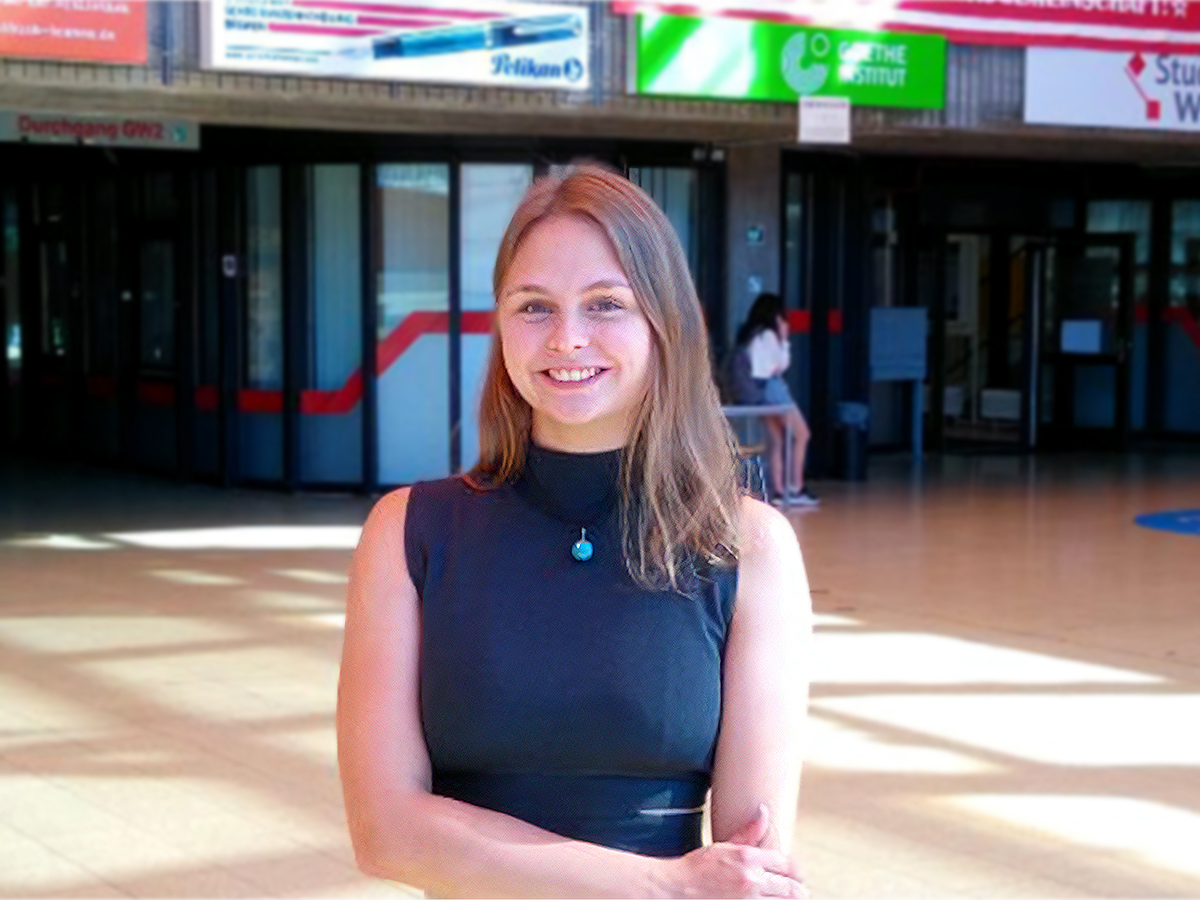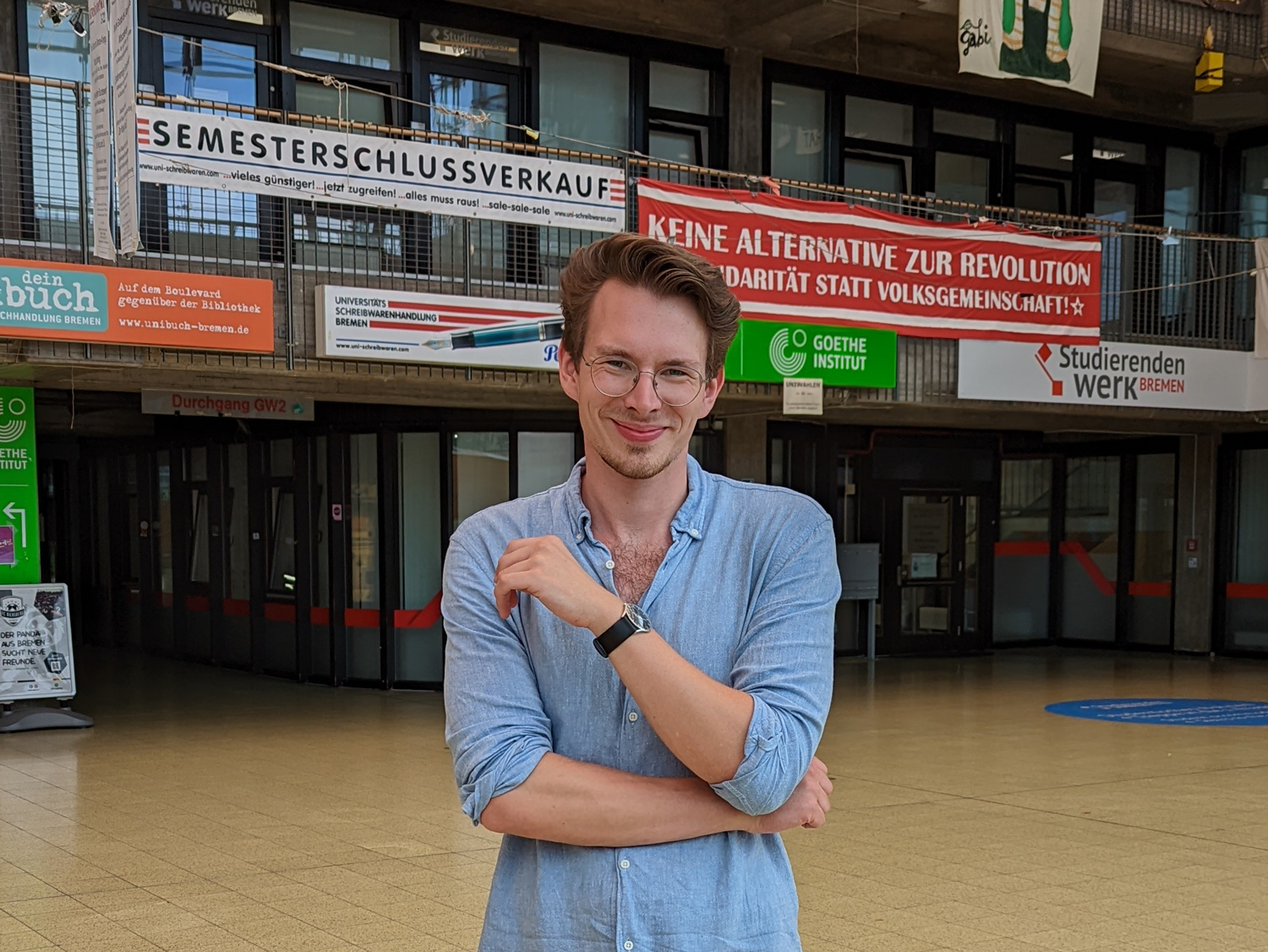
© Felix Clebowski / Universität Bremen
Sustainability: “There Is Currently a Culture Change Taking Place at the University of Bremen”
What is the state of sustainability at the University of Bremen? An assessment by Julia Broderius and Dominik Lange from Students for Future.
The 21-year-old Julia Broderius is studying a bachelor’s degree in Psychology and is an elected member of the student representation on the commission for sustainability, climate justice, and climate neutrality of the Academic Senate (AS). The 27-year-old Dominik Lange is studying a master’s degree in Philosophy, is a speaker for higher education policy in the AStA and a member of the AS. Both are part of the Students for Future. Climate protection and sustainability are very important to them. That’s why we discussed this and the newly created sustainability, climate justice, and climate neutrality – the NKK commission for short. The commission is currently working on the University of Bremen’s sustainability strategy.
How do you rate the approach to sustainability at the University of Bremen?
Dominik: There is currently a culture change taking place at the University of Bremen. The university is becoming more and more aware that the topic of sustainability can no longer be ignored. The new President Jutta Günther would like to make this topic the main focus, which I think is very good. This is one of the reasons why we as students supported her in being elected as President. I think she is someone who wants to tackle social projects with a lot of determination through a very direct approach. At the same time, she appears very authentic, which is why I think she’s capable of making such a change. We always had the impression that she really listened to our concerns.

© Universität Bremen
Julia: But change is also necessary, because there are a lot of people who have fought for change for a long time. I am talking about Doris Sövegjarto-Wigbers, for example. Her many years of commitment have to be acknowledged here. At the moment, the situation at the university is fundamentally developing in the right direction and we, as students, can put a lot of energy into driving this process forward. At the same time, however, we should not stop criticizing wrong and slow developments. The change that is currently taking place is to be seen positively, but up to now, the decisions of the committees have produced paper above all else.
What do you mean?
Dominik: For example, the rescue of the Virtual Academy of Sustainability is a good sign, because it allows students from all German universities to take part in courses on sustainable development and receive credit points. The academy is now not only financed by third-party funds, but directly by the university. But there should be more in the future. So far, these have mainly been individual measures, but I hope that Jutta Günther will tackle the major projects in the future. The students have placed great trust in her and now something has to happen.
“The Green Office should intervene and become a repository of knowledge for students in the field of sustainability.”
What big projects are you referring to?
Dominik: We are thinking in particular of the development of a sustainability strategy, a more frequent professorial appointment with a connection to sustainability, a greater focus on issues of climate justice, and the goal of becoming climate neutral as a university.

© Universität Bremen
Julia: First off, perhaps a point that seems rather small at first glance. With the Green Offices planned within the framework of the NKK commission. Student engagement has suffered greatly during the coronavirus pandemic. This poses a serious threat to the transfer of knowledge within the student body. And the fact is that the employees of the university usually spend longer at the university than the students. This creates certain hierarchies of knowledge.
The Green Office should intervene here and become a repository of knowledge for students in the field of sustainability and improve networking. This is important, because new students simply need to know what we have already achieved as Students for Future and what we are currently working on. This makes it much easier to contribute one’s own ideas and oneself more strongly and to further develop the entire process more quickly. And I think it’s good that the university has offered us two student positions for the Green Office. This gives active students the opportunity to obtain a paid position and create a repository of knowledge for future generations of students.
We live in a society that makes structurally unsustainable decision in many areas. This is very obvious when it comes to the exploitation of resources, but it also becomes clear when it comes to burnout, for example. We often overlook our physical and emotional resources, which is not a sustainable way of living. The key word here is social sustainability, for example.
Dominik: And in many other areas, it may not be clear at first glance what this has to do with sustainability. That’s why it’s particularly important to me that all faculties start taking responsibility. Also to promote climate justice.
“The energy revolution, for example, must not be pushed forward at the expense of disadvantaged groups.”
What do you mean by climate justice?
Dominik: We are talking about MAPA, the “Most Affected People and Areas.” We find this term more apt than to speak of the Global South. There are coastal towns, for example, that will be flooded in a few years. It is home to people who are least responsible for global carbon emissions and at the same time most affected by the consequences. These people, too, have to be offered a viable and sustainable perspective.
Here, the university can take even more initiative, especially in research and teaching. In this context, one should ask oneself how society can be made sustainable. The energy revolution, for example, must not be pushed forward at the expense of disadvantaged groups. For example in Bremen, we have the artec (Sustainability Research Center) and the ZMT (Leibniz Center for Tropical Marine Research), which are researching precisely these questions and need to be better equipped. The decisive term here is the socioecological transformation, in which the university needs to play a key role. Together with the entire university, the new President can and must provide strong impetus here.
To come back to the NKK commission. When do you expect specific projects to be implemented?
Julia: The basic time frame for the mission statement is 12 months. To this end, the Steering Group, headed by Jutta Günther, has already held two meetings. I expect that the Academic Senate will also be able to decide on the new mission statement within a year. I am very confident that this will be decided at the University of Bremen in mid 2023.
I am also very optimistic about the aforementioned Green Offices. We expect to be able to fill them by the end of 2022 at the latest.
Fundamentally, however, I think it is important for me to say that everything that is happening should be seen as a process and is therefore never completely finished. This is currently being initiated in order to establish long-term and sustainable changes. Here, I see the main task of the university as coming up with a sustainability strategy with clear and binding goals. Where do we want to be in 2030? Do we want to be climate-neutral by 2030? Or do we want to have a new research lighthouse on socioecological transformation research? We have already achieved a lot, but we are still at the very beginning on many issues.
Additional Information
More information about the work of Students for Future Bremen can be found on the website.